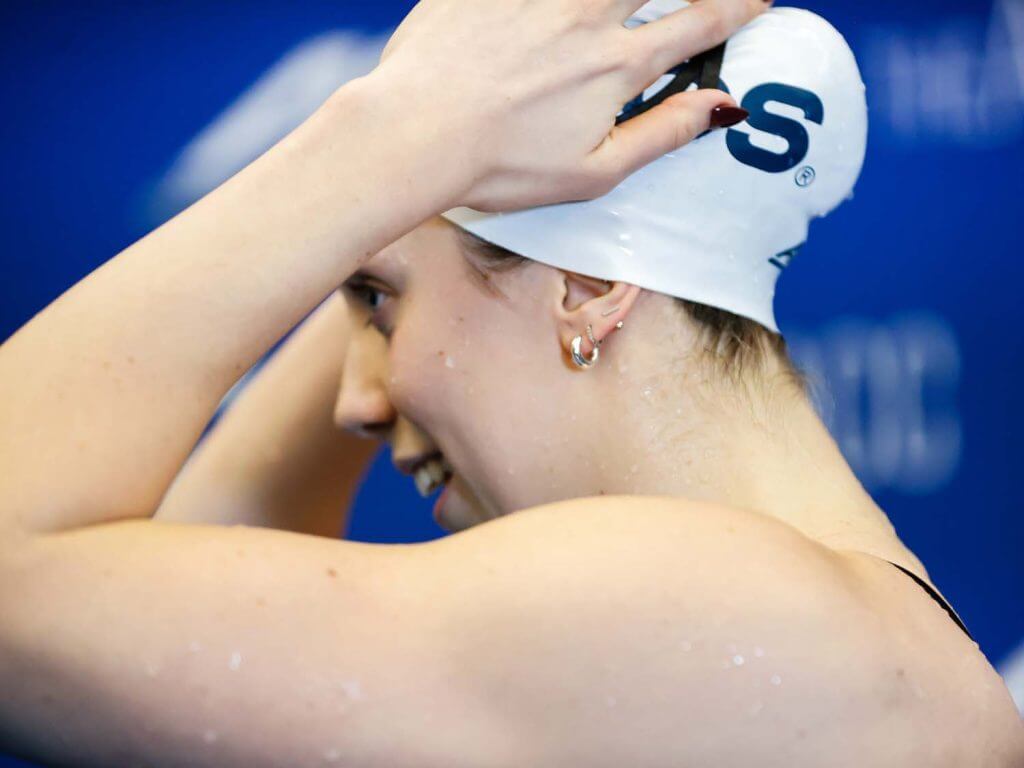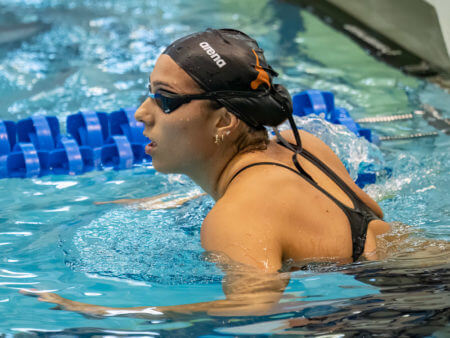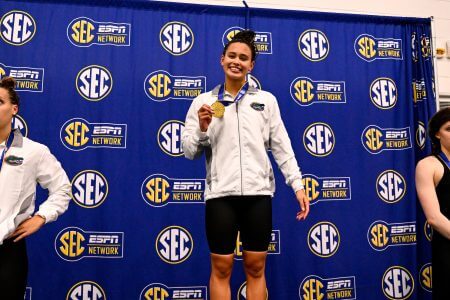NCAA Women’s Championships: Virginia Four-Peat Seems Inevitable But Storylines Abound

NCAA Women’s Championships: Virginia Four-Peat Seems Inevitable But Storylines Abound
Barring a dramatic upset, the University of Virginia will wrap up a fourth consecutive NCAA team title in women’s swimming and diving this week. Even with the graduation of two-time NCAA Swimmer of the Year Kate Douglass, expect the win to be dominant and thorough, with sisters Gretchen Walsh and Alex Walsh each seeded first and heavily favored in three individual events. Virginia is ranked first in four out of five relays, with the only exception being the 200 medley relay, where UVA’s second-seeded time was recorded without either Walsh sister on the squad.
But even with the winner seemingly obvious (and the same with second place, thanks to the University of Texas), don’t expect this NCAA Championships in Athens, Ga., to be a dud. Quite the opposite. Look for a dramatic three-and-a-half days of competition, with plenty of closely-contested races, records likely to go down and jockeying for team position among the top-10.
If anything, this pattern is one we are accustomed to at the women’s meet. We almost always know exactly who will win long before the competition begins. The last two years, Virginia has been in an identical position as strong favorites, winning by 127 points last year and 145.5 points the year before, and that certainly did not diminish the NCAA Championships, particularly as Douglass and the Walsh sisters scored record-breaking performances individually and in relays.
During the first year of Virginia’s streak, the Cavaliers were favored entering the meet before leading nearly wire-to-wire as the country saw Paige Madden at her peak, winning NCAA titles in the 200, 500 and 1650 freestyle. The 2020 meet, of course, was cancelled due to the onset of the COVID-19 pandemic, while 2019 was really the only hotly-contested women’s meet in recent memory, as a Stanford team led by Ella Eastin and Taylor Ruck had to fight to hold off a spirited effort from Abbey Weitzeil and Cal.
The two years prior were the seasons when Stanford dominated the national meet, in large part thanks to Katie Ledecky and Simone Manuel.
Again, the lack of a compelling team competition for the top spot does not mean a dearth of dramatic storylines. Consider some of the bigger ones we’ll be focusing on throughout the meet:
1. How low can Gretchen Walsh go?
The younger Walsh sister had everyone in anticipation each time she stepped to the blocks at the ACC Championships. Walsh ended up breaking four individual records, twice lowering the mark she shared with Maggie Mac Neil in the 50 free, beating Douglass’ official record and Walsh’s own unofficial record in the 100 butterfly and almost becoming the first swimmer under 48 in the 100 backstroke on a relay leadoff before taking down Manuel’s long-standing 100 free record.
Each one of those marks will be in jeopardy again in Athens, with Walsh passing on a chance to win defend her 100 back title in favor of swimming the wide-open 100 fly instead, although she will surely retain backstroke duties for Virginia’s medley relays. The 21-year-old from Nashville has also supplied unprecedented relay speed, including the first-ever sub-20 50 free split at ACCs. Do not dare look away whenever Walsh is in the pool in case another record goes down.
2. Is this the best Texas team yet?

Texas fifth-year swimmer Kelly Pash — Photo Courtesy: Peter H. Bick
The national runnerup each of the last two years, Texas might be peaking this season after losing few key contributors aside from butterflyer Dakota Luther and with many of its top names finishing out their college careers. The versatile Kelly Pash is a fifth-year swimmer after serving as the centerpiece for the Texas relays for her entire career with the Longhorns while defending 200 fly national champion Emma Sticklen is a senior, as is breaststroke standout Anna Elendt. Erica Sullivan, the 2021 Olympic silver medalist in the 1500-meter free, is using her final season of eligibility.
Lydia Jacoby is back to try to win another title in the 100 breaststroke, likely to be among the most hotly-contested races of the meet, while Hailey Hernandez, Jordan Skilken and the Texas diving group will score legitimate points, far more than any other top contender in swimming. Add in a talented freshman class led by World Championship relay medalist Erin Gemmell. Texas won’t be going away after this season, but it’s something of a “last dance” for head coach Carol Capitani’s group, at least this version of the team.
3. Don’t forget about Bella Sims and Florida.
Yes, the Gators placed ninth last year, but that was before the arrival of Olympic and World Championship medalist Bella Sims, who holds down the top time in the country in the 500 free, 200 free and 200 back. As a high schooler, she broke 4:30 in the 500 free while no collegian has achieved that mark since Ledecky graduated. She could go sub-1:40 in the 200 free while she is favored over backstroke specialists Phoebe Bacon and Isabelle Stadden in that event.

Florida’s Bella Sims — Photo Courtesy: Luke Allen/Auburn Tigers
Add in Isabel Ivey, a transfer from Cal seeded second in the 200 IM and 100 free and third in the 200 free. Olympic medalist Emma Weyant is having arguably her best season, with top-three seeds in the 500 free and 400 IM plus a chance at a top-eight finish in the 1650 free. The Sims-Ivey duo will result in Florida moving up significantly in relays, while the likes of Olivia Peoples (100 fly) and Zoe Dixon (IMs) could contribute points and freshman Molly Mayne is already a difference-maker in breaststroke.
Yes, Florida is peaking this year, and third place is within range.
4. Bring on the racing!
With Walsh, Walsh and Sims likely to win the majority of events at this year’s meet, that doesn’t leave a lot of room for nail-biters, but we have two about which we should not forget: the 100 breaststroke, where six swimmers are seeded less than one second apart, and the 1650 freestyle, always an exciting strategic battle to kick off the final night.
The 100 breast field features six swimmers seeded within a second, with Tennessee’s Mona McSharry and USC’s Kaityln Dobler having broken 57 already this year while Virginia’s Jasmine Nocentini, a transfer swimmer who has made huge contributions to the Cavaliers’ cause this year, is just off at 57.01. The field knows better than to forget about Jacoby, who pulled off an Olympic stunner in 2021 and then a less-surprising win at NCAAs last year, and then Elendt and Ohio State’s Hannah Bach round out the serious contenders.
In the mile, Abby McCulloh will try to provide some excitement for the Georgia fans watching inside the Bauerle Pool at Gabrielsen Natatorium, and we could see contenders come from just about anywhere in the final heat. Vastly-improved Stanford swimmer Aurora Roghair and Indiana’s 2023 runnerup Ching Hwee Gan will be on either side of McCulloh, with Sullivan lurking in lane six. The other swimmers in the top heat include Arizona State’s Deniz Ertan, Penn’s Anna Kalandadze, Weyant and, in lane eight, 2022 winner Paige McKenna of Wisconsin. Who says the mile is boring to watch?
5. Another Virginia relay sweep incoming?
OK, one more note about the team likely to secure a four-peat this week. Can Virginia sweep all the relays again? The answer is probably. The only questionable relay last season was the 800 free relay, but the team of Aimee Canny, Alex Walsh, Reilly Tiltmann and Ella Nelson pulled off an upset against a Stanford team led by Ruck and Torri Huske. With both of the Cardinal’s stars gone this year, the Cavaliers will likely win this one again. Gretchen Walsh led off this relay at ACCs, with her 1:40.23 clocking making her the third-fastest 200 freestyler ever, but even if she skips this relay to focus on the shorter four (as expected), no one is catching up to the Cavaliers.
Similar story on the 200 and 400-yard relays, with the additions of one Walsh sister or both to the 200 medley relay likely sufficient to overtake top-seed Ohio State. The bigger question mark is relay records, with Virginia trying to overcome the absence of Douglass to swim faster than ever before. The addition of Nocentini to the sprint groups has certainly helped that cause — particularly in breaststroke, where she fills the void left by Alexis Wenger’s 2022 graduation.
Entering the fourth year of this budding Virginia dynasty, and the scintillating times in individual events and relays continue to impress. Even with another team title seemingly on lockdown, the continued run on records will keep Virginia at the center of everyone’s attention this week?
.jpg)
- PSYCH SHEET, TEAM ROSTERS
- LIVE RESULTS
- DAY 1 HEAT SHEETS
- DAY 1 RESULTS
- DAY 2 PRELIMS HEAT SHEETS
- DAY 2 PRELIMS RESULTS
- DAY 2 FINALS HEAT SHEETS
- DAY 2 FINALS RESULTS
- DAY 3 PRELIMS HEAT SHEETS
- DAY 3 PRELIMS RESULTS
- DAY 3 FINALS HEAT SHEETS
- DAY 3 FINALS RESULTS
- DAY 4 PRELIMS HEAT SHEETS
- DAY 4 PRELIMS RESULTS
- DAY 4 FINALS HEAT SHEETS
- DAY 4 FINALS RESULTS
- 2024 COMPLETE RESULTS



